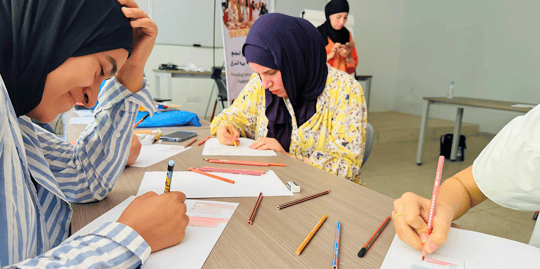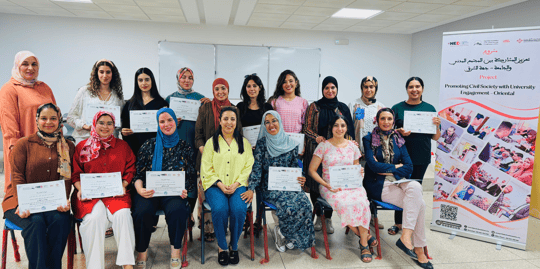Navigating 7 Areas of Empowerment as a Young Woman

Why is empowerment so important for young women? The High Atlas Foundation’s recent IMAGINE empowerment workshop with female students from the Legal Clinic program at University Mohammed I has given insight into this important question. The workshop centered around seven key concepts–emotions, relationships, body, sexuality, money, work, and spirituality–topics that many young women never delve deeply into for a number of reasons from internal limiting beliefs to societal pressures.
Going into the four-day workshop, HAF’s Program Coordinator and Empowerment Facilitator Mariam Ait Hfid had a few main objectives. One goal was to enable the participants to explore and strengthen their inner selves through participatory and reflective methods. Critical to this transformation process was the encouragement of self-awareness, decision-making, and personal responsibility building. Mariam also aimed to build a supportive and open space where participants felt comfortable sharing experiences, overcoming limiting beliefs, and gaining the confidence they needed to change their communities.
7 Areas of Empowerment
Emotions and Relationships
After an initial day of introductions and defining terms and objectives, the remaining workshop days turned to the seven key areas of discussion. Many people can relate to the difficulty of expressing inner emotions and defining the relationships that surround them, and these women were no exception. But, in no time, they began to share their thoughts and speak clearly about a range of feelings, from hope and happiness to disappointment and anxiety. Just as important was their brainstorming of methods to free themselves from any limiting beliefs.
"I listened to a variety of experiences shared by the participants, and that helped me see my own journey more clearly."
Sexuality
Discussion soon moved toward another topic, sexuality, during which the women shared how culture, religion, and social norms had shaped their understanding of what this concept means. In a show of honest self-awareness, many even expressed the need for more openness and education within themselves in this area. The free discussion around an often taboo topic helped to dismantle any shame associated with recognizing one’s sexuality and encouraged greater levels of respect for the body and emotional intimacy.
"I learned the importance of taking care of the body—it touched me deeply due to a personal experience."
Body
After establishing this basis of respect with one’s body, the participants were then able to connect even more deeply with their bodies through guided visualizations and sharing circles where they discussed topics like body image, health, and self-care. A few participants even shared more personal experiences of physical trauma and shame, and the session was able to act as a stepping stone on their journey toward healing and body appreciation. One woman said, “I learned that my body is not something to hide, but something to honor.” These inner thoughts are unfortunately all too common among young women, emphasizing the pressing need for open discussion that leads to mindset changes and self-love.
These revelations came to light from the deep and personal dialogue between the individual and their body, aided by guided reflections that asked questions like: “Have I treated my body as it deserves?” and “If my body could speak to me, what would it say?”
The responses were striking. Most participants admitted that they had neglected or mistreated their bodies–through exhaustion, shame, poor self-care, or harsh self-criticism. When asked to imagine how their body would speak back to them, many expressed powerful messages such as: “Please take care of me.” “Be kind to me.” “Have mercy on me.”
"I realized that I had been seeing some aspects of life from a distorted perspective."
This exercise stirred strong emotions and taught an important lesson: why do we feel others are more deserving of respect and kindness than ourselves? After these emotional shifts, participants began to view their bodies not as objects meant to judge but as sacred companions deserving of the most sincere forms of love and care. For one participant, it was the first time she saw her body as truly part of herself, saying it was “not something I needed to fix or hide, but something to listen to.”
Money
The workshop also covered another important skill set in life: financial awareness. This session focused on women’s relationship with money, spending, saving, earning, and financial independence, topics arguably all people should be educated on early in life. Participants explored their inherited beliefs about these topics like “money is not for women” or “men should manage the finances”. Through reflection, they began building a new money mindset centered on freedom, planning, and self-worth, showing that financial freedom is possible for young women.
“I felt safe, heard, and supported, which allowed me to open up.”
One participant shared a powerful personal story related to financial beliefs. She expressed that, from a young age, she had developed a deep discomfort with accepting gifts or material support from others. In her mind, receiving anything, even something small, meant giving others the power to hold a debt over her head.
She gave the example of going to a coffee shop with friends, a simple experience meant to be enjoyable. She discussed how she would always insist on paying the entire bill, not to show off wealth, but to protect herself from the vulnerability that she felt from being “helped” by others. Throughout the workshop, she realized that this belief was rooted in fear and past experiences, and she was able to begin questioning whether her refusal of help was a sign of strength or a barrier to connection and trust with others.
With the support of the group, she began to recognize her limiting belief and explore it, coming to understand how they were shaped by earlier experiences where accepting support had led to shame or judgement. After this recognition, she quickly became open to learning to receive with gratitude rather than fear, shame, or the assumption of rejection.
"When I returned home, I reflected deeply on my life and began making concrete commitments."
Work
This story, along with all the other young women in similar positions, is a profound reminder that when we challenge our inner narratives, we create space for healthier relationships, emotional freedom, and a more balanced approach to giving and receiving. Participants dreamt bigger, set tangible goals, and committed to taking bold steps towards internships, entrepreneurship, or activism.
"I observed a positive change in myself from the first day to the last."
Spirituality
The final area of discussion provided participants with an opportunity to connect with their inner peace and personal beliefs, leaving them feeling calm, hopeful, and reflective going forward. Each woman explored what spirituality meant for her, helping to ground the transformation made throughout the earlier exercises in the workshop.
Lessons Learned
This workshop was not simply a training session—it was a transformative experience that reaffirmed the importance of internal empowerment as a foundation for broader social change. It demonstrated that real empowerment begins with self-awareness, and that fostering women's inner strength is key to building resilient, just, and inclusive communities.
